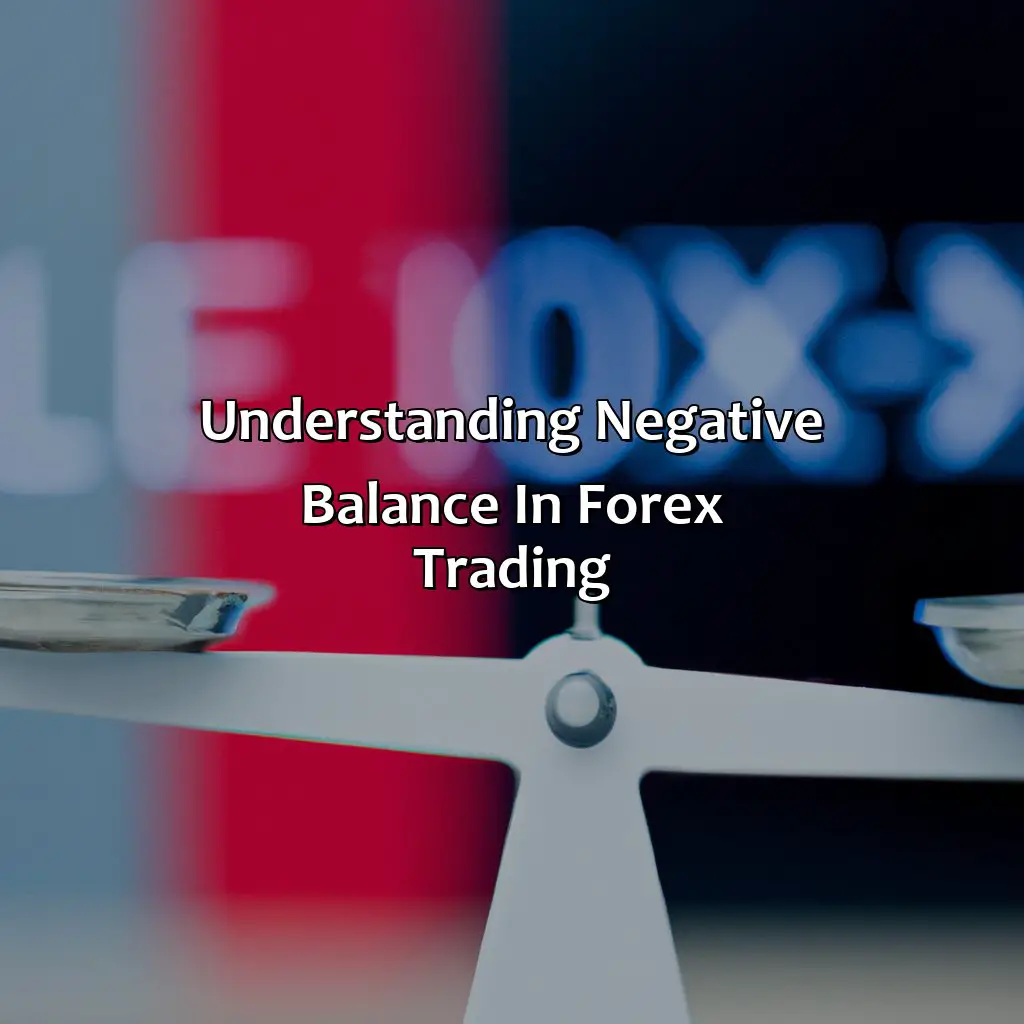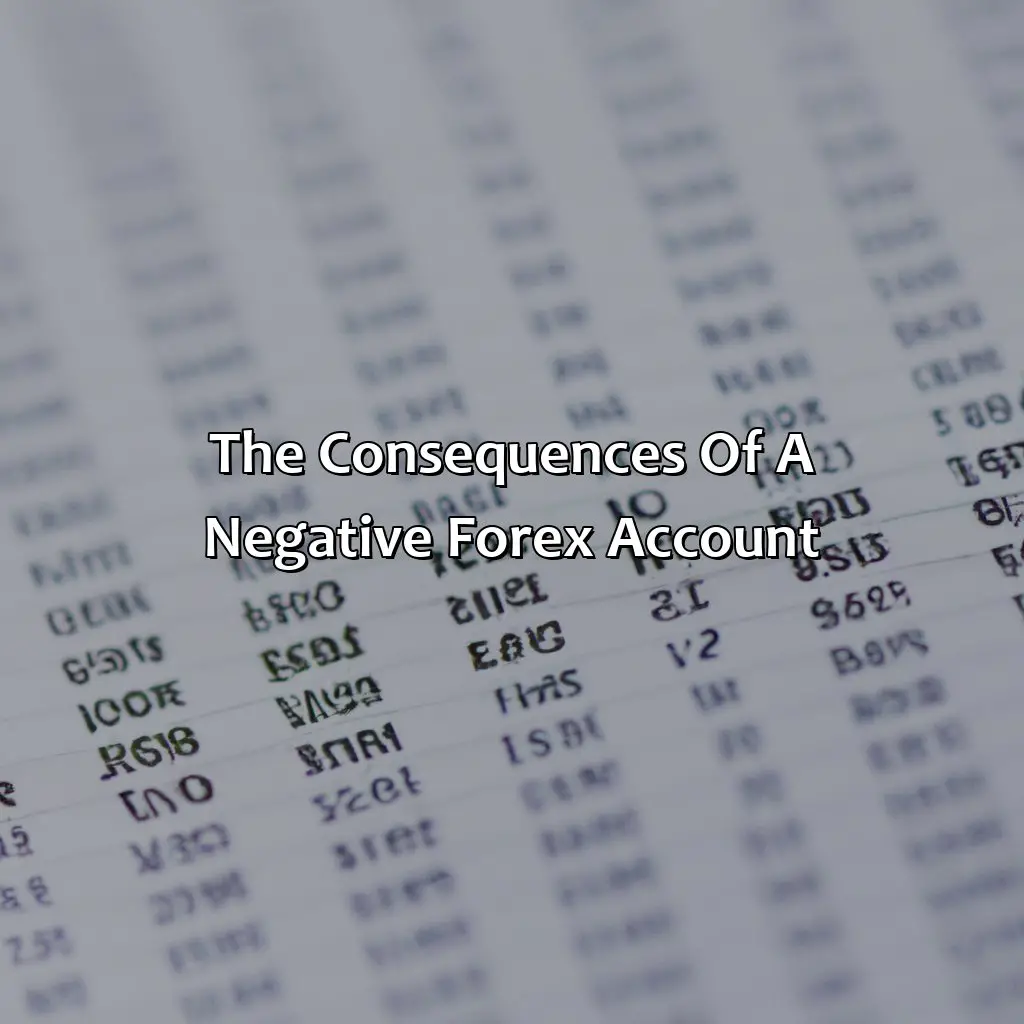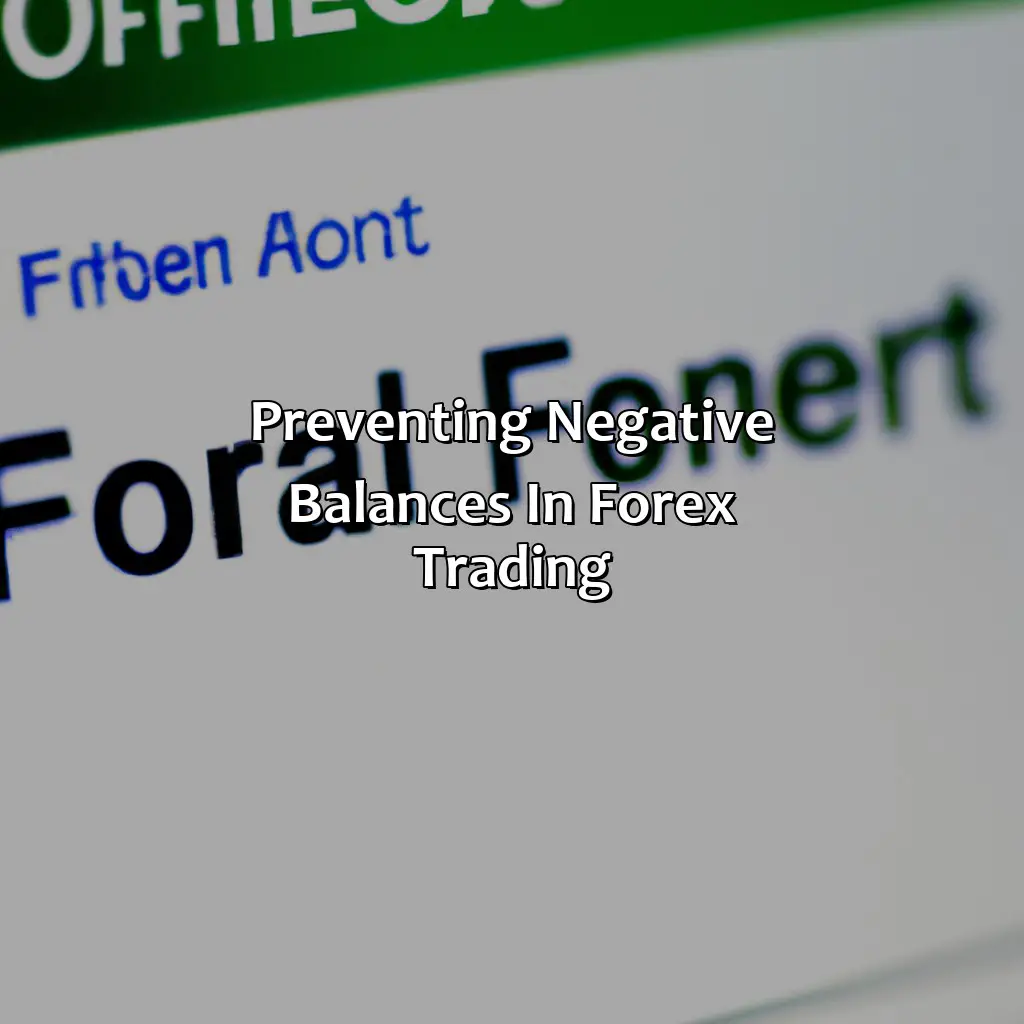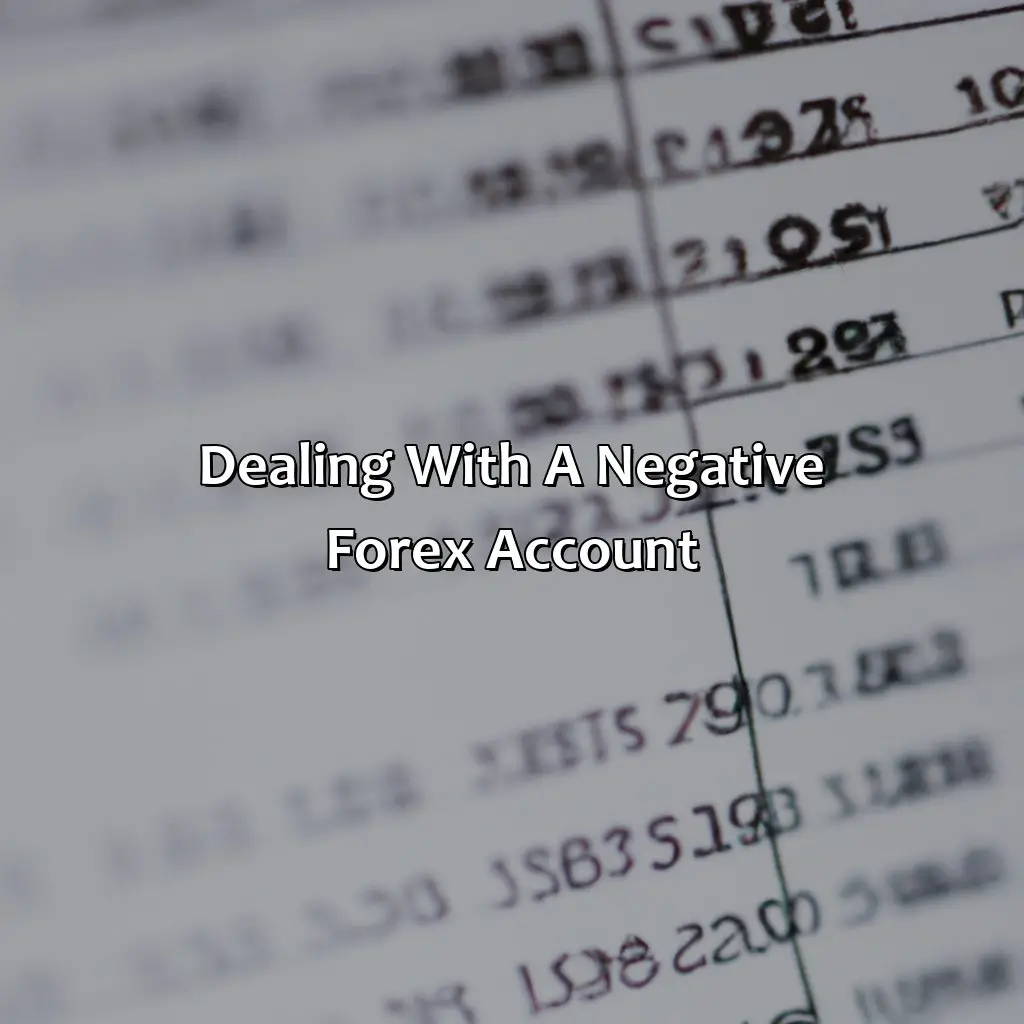
Key Takeaways:
- Understanding negative balance in Forex trading is essential to avoid such situations. Traders should always be aware of their account balance, margin requirements, and stop out levels.
- The consequences of a negative Forex account can be severe and long-lasting, including professional and legal ramifications and personal financial consequences. Traders should develop effective risk management strategies to prevent negative balances.
- Preventing negative balances involves setting realistic expectations, choosing the right Forex broker, and implementing effective risk management strategies such as capital preservation and profit maximization.
- In case of a negative Forex account, traders should communicate with their broker, explore legal options, and focus on rebuilding their trading account using effective risk management and trading strategies.
- Diligence and disciplined risk management are crucial in Forex trading to mitigate the risk of negative balances and losses, especially in an inherently volatile market.
Understanding Negative Balance in Forex Trading

Photo Credits: forexbrokerreport.com by Bruce Hall
Negative balance in forex trading occurs when a trader incurs trading losses that exceed their account balance. This can result in a debt owed to the broker. To prevent this, traders must use proper risk management and understand margin requirements.
It is important to note that negative balance protection policies vary among brokers. Some brokers may forgive negative balances, while others may require immediate repayment. Traders should also be aware of the stop out level, which is the point where the broker will close out a trader’s positions to prevent further losses.
Traders should also consider the impact of market volatility on their positions and understand the use of leverage. Proper trader psychology also plays a role in minimizing the risk of negative balance.
In a true story, a trader failed to use proper risk management and incurred significant losses on a currency pair due to unexpected market movements. The trader’s account balance went negative and they were required to repay the debt to the broker. This situation could have been avoided with proper risk management techniques.
Overall, it is important for forex traders to understand the risk of negative balance and take preventative measures to avoid it. Proper risk management, understanding margin requirements, and considering market volatility are all crucial elements in minimizing the risk of negative balance.
The Consequences of a Negative Forex Account

Photo Credits: forexbrokerreport.com by Noah Lewis
It is essential to understand the risks of losing trades to prevent a negative Forex account. Risk management is the key to stop any bad results, such as professional and legal issues.
We will look into two sub-sections:
- Professional and Legal Ramifications
- Personal Financial Consequences related to negative Forex accounts.
This will give us important information on trading psychology, risk appetite, forex knowledge, and more elements needed for Forex trading.
Professional and Legal Ramifications
Forex traders who end up with a negative account balance face severe professional and legal ramifications. Trading psychology, risk appetite, capital preservation, and trading discipline play vital roles in managing a forex account effectively. Failing to comply with forex regulations or engaging in unscrupulous activities puts the trader at risk of being fined or even being barred from trading altogether.
Any legal action taken against the trader can have far-reaching consequences that could impact one’s future financial credibility, as well as their personal relationships and mental health. Therefore, it is always crucial to abide by all forex laws and regulations to prevent falling into trouble with legal authorities.
In the case of a negative account balance, traders may find themselves unable to meet their financial obligations related to forex trading. For instance, traders may be required to repay their broker or other market participants for any losses incurred because of negative balances. This failure can lead to severe financial difficulties, withdrawal of credit facilities and discounted financial products like loans and insurance policies.
It is essential for traders to take proactive measures when it comes to preventing negative balances in their accounts. These include creating a robust risk management plan that takes into consideration the trader’s trading psychology, emotional control and identification of profitable trades upfront versus high-risk losing trades.
Traders should also enroll in ongoing forex education programs where they can learn valuable information about market trends, chart patterns, technical indicators, fundamental indicators, and industry jargon. Additionally, they should consider finding a trading mentor who has proven experience in the industry to help them navigate challenging situations that arise while trading real money.
Dealing successfully with a negative account balance requires effective communication with brokers or involved third-parties when an event happens. Traders mustn’t shy away from this duty as prompt communication helps both parties reach an agreeable solution quickly. If necessary take proper legal advice before taking any drastic actions like liquidating assets or withdrawing cash from banks because harsher consequences might follow from these actions.
Finally, always keep in mind that forex trading is a high-risk venture that calls for extreme discipline and risk management capabilities. Traders should assess their risk appetite wisely when they decide to trade forex, keeping away from unrealistic expectations about returns and using proper money management and position sizing. Always document your trades in a trading diary/journal to help track progress, identify weak areas, analyze successful strategies through backtesting, or demo trading before starting live trading with bigger accounts.
When it comes to personal financial consequences of a negative Forex account, think of it as a bad hair day that lasts a lot longer.
Personal Financial Consequences
Experiencing negative balance in a forex account can have severe personal financial consequences. In such a situation, the trader may have to pay the broker not just for the trading losses but also for any additional expenses incurred due to margin calls or stop out level breaches. This could lead to debt obligations and legal issues for the trader.
Furthermore, negative balance can severely impact the trader’s credit score and limit their ability to access other financial instruments such as loans and credit cards. It could also potentially harm their professional reputation in the financial markets.
To prevent negative balances, traders should take proactive risk management strategies such as setting stop loss and take profit levels and adopting technical and fundamental analysis of currency pairs based on market volatility, economic indicators, central bank policies, news events and more. Additionally, traders must choose reputable forex brokers with adequate account funding options and realistic bid-ask spreads while minimizing slippage, swap fees and trading commissions.
In case of a negative balance occurrence, traders should immediately communicate with their broker in an effort to resolve any issues. They may also consider legal options or servicing debts through account rebuild efforts like incremental deposits or seeking guidance from professionals on prudent trading strategies that factor in their individual trader psychology.
Choose your forex broker wisely, because not all of them will save you from drowning in negative balances.
Preventing Negative Balances in Forex Trading

Photo Credits: forexbrokerreport.com by Anthony King
Protect against losses in forex trading by doing three things:
- Implement risk management strategies. These involve controlling emotions, maintaining discipline, preserving capital and maximizing profits.
- Establish realistic expectations. This includes having an understanding of trading psychology, controlling emotions and recognizing market sentiment.
- Select the right forex broker. This requires knowing the bid-ask spread, slippage, how to fund and withdraw from accounts, swap fees and trading commissions.
Risk Management Strategies
To ensure positive outcomes in forex trading, traders must follow proper risk management strategies. These involve understanding trader psychology and recognizing the need for emotional control and disciplined trading. Adequate capital preservation measures are essential to avoid negative balances and maximize profits.
Developing a strong risk appetite and choosing trades wisely can help reduce the likelihood of negative balances. Effective risk management strategies also include adjusting stop-loss orders, building diverse portfolios, and establishing realistic profit expectations.
In addition to these methods, traders must choose reputable forex brokers who offer reliable account monitoring services. Regularly reviewing trading account balances and avoiding excessive leverage can also minimize risk exposure.
Failure to manage risks effectively can result in serious consequences such as personal financial loss and damage to professional reputation. It is crucial to communicate with brokers if a negative balance occurs and explore legal options if necessary. Finally, rebuilding a trading account involves careful assessment of past mistakes and implementing new strategies.
By following sound risk management strategies, traders can protect their investments while maximizing profits. Without due diligence in this area, forex trading can lead to detrimental outcomes that could have been avoided with proper planning and discipline. Don’t miss out on the rewards of successful forex trading by neglecting these critical elements of financial success.
Setting realistic expectations is crucial in Forex trading, unless you enjoy emotional rollercoasters and unexpected financial dives.
Setting Realistic Expectations
Realistic Expectations are vital to Forex Trading Psychology and Emotional Control. A trader should accept that every investor incurs a certain amount of loss due to market sentiment, economic variables, and Trading Discipline. Trading is not easy, but it is possible to make a profit in the long run with a consistent approach.
Being realistic about profits can help reduce stress, minimize unrealistic risks and establish appropriate sizes of positions. Additionally, it will enable you to consider Risk Management Strategies that align precisely with your abilities and risk tolerance level.
Furthermore, considering the Hard Truth will help you understand the industry standards better and avoid high-profit expectations in the short term. Keeping up with other traders might seem necessary at times, but their trade methods may differ from yours. Therefore, it’s essential to set individual goals complemented by the overall market scenario using Technical Analysis or Fundamental Analysis or both.
Having an effective position sizing strategy is crucial for proper execution of trades without significantly risking one’s capital amount. Moreover, it is fundamental to perform ongoing research regarding currency pairs that display high volatility levels while practicing trading psychology principles so that emotions do not dictate your decisions.
Pro Tip: By having Realistic Expectations about one’s own capabilities and market forces while maintaining trading discipline during transactions puts traders in a higher chance of success.
Don’t let a dodgy Forex broker turn your financial dreams into a nightmare.
Choosing the Right Forex Broker
Choosing the appropriate Forex broker requires a diligent review of their policies and regulations. Researching the requirements for your chosen broker’s account funding process, withdrawal policies, bid-ask spread, slippage, swap fees and trading commissions is crucial. Ensure that they comply with the regulatory bodies in their country or region of operation to prevent fraudulent activities.
It is also crucial to read reviews from other traders about their experiences with various brokers before selecting one. Look for ones who offer demo accounts so you can practice the different strategies without risking actual funds. You must take into consideration criteria like reputation, credibility level as well as customer care services during emergencies.
The consequences of choosing an incorrect Forex broker can lead to negative balance situations leading to possible loss growth. Always opt for a regulated broker that offers educational resources and takes security precautions seriously.
Don’t miss out on the benefits of picking the right forex broker! So before you choose, learn about how each potential broker complies with regulations along with its trading conditions.
When it comes to dealing with a negative forex account, communication with your broker is key – but if that doesn’t work, legal options and rebuilding your account might be necessary.
Dealing with a Negative Forex Account

Photo Credits: forexbrokerreport.com by Adam Flores
Strategizing is key to dealing with a negative forex account. Talk to your broker! Also, consider trader psychology, emotional control, risk management, trading discipline, order execution, slippage, and bid-ask spread.
Forex regulations provide legal options. Rebuilding your trading account? Look to trader psychology, emotional control, risk management, trading discipline, money management, trading signals, technical analysis, and fundamental analysis.
Communication with Broker
Effective Ways to Communicate with Your Forex Broker
The key to solving a negative forex account is effective communication with your broker. To start, send an email or call your broker in a calm tone of voice. Explain the situation and ask for their assistance in resolving the issue. Use trader psychology and emotional control while communicating.
To communicate effectively, utilize trading discipline and risk management strategies you have previously learned. Ask questions and clarify any doubts you may have about order execution, slippage, and bid-ask spread. This helps eliminate misunderstandings between you and your broker.
A unique addition to this is building a rapport with your broker so they can understand better how best to work out solutions for you. It is important to identify your goals as a trader, so that your broker can offer more suitable recommendations on trades.
Forex regulations may limit your legal options, but it’s still worth exploring them to remedy a negative account.
Legal Options
Forex traders facing negative balances have legal recourse under forex regulations. If brokers fail to adhere to margin requirements and liquidate positions, traders can initiate legal proceedings, such as filing a complaint with regulatory agencies or pursuing litigation for damages incurred. Seeking legal options can help mitigate personal financial consequences, though it is important for traders to thoroughly investigate their broker’s policies and scrutinize any agreement before signing.
Rebuilding a trading account requires more than just a positive attitude, it demands mastering trader psychology and disciplined risk management strategies.
Rebuilding Your Trading Account
Rebuilding Your Forex Trading Account after a Negative Balance
Dealing with a negative balance in your forex account can be overwhelming, but it’s important to take responsibility and work towards rebuilding your trading account. Here are six steps to help you get back on track:
- Assess the Damage: Look at your overall financial situation, including other accounts, debts, and income sources. This will help you determine how much you can realistically invest in rebuilding your forex account.
- Analyze Your Trading Strategy: Carefully assess your previous trading decisions and analyze which strategies led to the negative balance. Evaluate whether or not you need to change your approach, improve risk management, or need more training.
- Practice Emotional Control: Control your emotions while making trading decisions. No matter what happens in the market, stick to your trading strategy.
- Money Management: Develop a money management plan that suits your trading strategy. Calculate the amount of money that needs to be invested for each trade based on average returns and losses.
- Stay Disciplined: Maintain discipline and consistency in following your plan while avoiding impulsive actions based on emotions.
- Seek Trading Signals & Analysis: Use technical analysis tools or seek help from experienced traders who use fundamental analysis data for better predictions.
It’s essential to maintain trader psychology by focusing on emotional control, disciplined behavior, risk management, trading signals & analysis along with money management while rebuilding a forex account post a negative balance situation.
Finally, according to an article by Investopedia¹, set realistic expectations as it is no wonder that seasoned forex traders often advise beginners to start slowly and gradually build their trading experience over time.
Source:
- https://www.investopedia.com/articles/trading/08/nine-forex-trading-tips.asp
Five Facts About What Happens If Your Forex Account Goes Negative:
- ✅ If your forex account goes negative, you are responsible for paying back the negative balance to your broker. (Source: Investopedia)
- ✅ The risk of a negative forex account balance is higher when trading with high leverage. (Source: DailyFX)
- ✅ Most reputable forex brokers have policies in place to protect traders from negative balances, such as automatic margin calls and stop loss orders. (Source: FXCM)
- ✅ If you are unable to pay back a negative forex account balance, it may affect your credit score and ability to borrow in the future. (Source: MyChargeBack)
- ✅ It is important to carefully manage risk and avoid over-leveraging when trading forex in order to minimize the risk of a negative account balance. (Source: The Balance)
FAQs about What Happens If Your Forex Account Goes Negative
What happens if my forex account goes negative?
If your forex account balance falls below zero, it means that your account has entered into a negative balance. You will be responsible for this negative balance and you must make arrangements to repay the debt immediately. If you are unable to repay the debt, your broker may take legal action to recover the funds.
Can the negative balance extend beyond my account balance?
Yes, in certain cases, the negative balance may extend beyond your account balance. This is because of leverage – which means that you are trading with borrowed money. If your losses exceed your account balance, you will enter into negative balance territory. However, some brokers have safeguards in place that will limit your liability to your account balance.
Can a stop loss protect me from a negative balance?
While stop loss orders are designed to limit your potential losses, they cannot fully protect you from a negative balance. In volatile market conditions, it is possible for the price to gap – which means that the price jumps over the level at which your stop loss order is set. This can cause your account to enter into negative balance territory.
Can I lose more than my initial investment in forex trading?
Yes, forex trading involves leveraged products which means that you can lose more than your initial investment. This is because you are essentially trading with borrowed money. If the market moves against you, your losses will be magnified. It is important to use risk management tools such as stop losses and to only trade with money that you can afford to lose.
How can I prevent my forex account from going into negative balance?
To prevent your forex account from going into negative balance, it is important to use appropriate risk management tools such as stop losses and limit orders. It is also essential to monitor your positions and avoid over-trading. You should also ensure that your broker has safeguards in place to limit your liability in the event of a negative balance.
What should I do if my forex account goes into negative balance?
If your forex account goes into negative balance, it is important to contact your broker immediately to discuss repayment options. It is also crucial to seek independent financial advice to help you manage your overall financial situation. In extreme cases, if you are unable to repay the debt, your broker may take legal action to recover the funds.


